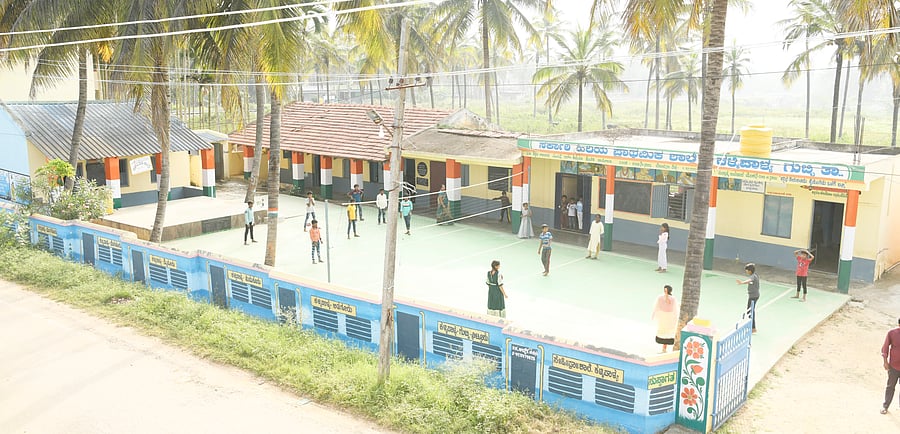
A tennis court and compound wall constructed at Kallipalya School in Tumakuru's Gubbi taluk.
Credit: DH Photo
Tumakuru: Once crumbling, rain-leaking, and stripped of their charm, many government schools across the Tumakuru district have been revitalised, thanks to the Mahatma Gandhi National Rural Employment Guarantee Act (MGNREGA) Scheme. The district has spent Rs 122 crore in a single year (2024–25) towards comprehensive school development under the scheme.
Thousands of schools, previously on the brink of ruin, have now undergone a transformation. A total of 3,660 school development projects were undertaken in the 2024–25 fiscal year alone, including the construction of 906 playgrounds, 1,360 compound walls, and 1,394 toilets.
The initiative not only improved educational infrastructure but also significantly contributed to rural employment. School development projects generated 3.32 lakh person-days last year, placing Tumakuru at the top in Karnataka for person-day generation and earning the district a state-level award.
Bringing sports back
Many rural schools lacked basic playgrounds, limiting students’ participation in physical activities. Confined to classrooms, children were deprived of opportunities to nurture their talents. The district administration, through MGNREGS, identified schools in need and developed 906 playgrounds equipped for volleyball, throwball, badminton, and kabaddi. As a result, student involvement in sports has seen a noticeable rise, with equal emphasis now being given to co-curricular activities.
Enhanced safety
Previously, school premises were vulnerable to misuse during nighttime hours, becoming hotspots for illegal activities. Teachers struggled to maintain discipline beyond school hours. The construction of compound walls under MGNREGS has addressed this issue, effectively. Incidents such as discarded liquor bottles and unauthorised entry have been brought under control, ensuring a safer and more conducive learning environment.
Local infrastructure
“In MGNREGS, the focus is not just on providing wages to labourers but also on developing local infrastructure. Emphasis is being placed on comprehensive school development. With the support of MGNREGS, the Viveka Scheme, and Zilla Panchayat grants, the very face of schools is being transformed,” said Zilla Panchayat CEO G Prabhu.
“In the past year alone, around Rs 250 crore has been spent on school development — including Rs 122 crore under MGNREGS, Rs 52 crore through the Viveka Scheme, Rs 45 crore from ZP grants, and additional funds from other departments,” he explained.
Classrooms in despair
As per officials, government schools across Tumakuru district still require 600 new classrooms to meet the growing demands. While 400 classrooms have already been constructed under schemes other than MGNREGS, the remaining 200 are slated for construction this year.
Out of the 15,000 classrooms across the district’s two educational zones, 1,900 are in urgent need of repairs. For the current financial year, the target is to renovate at least 1,200 of these, officials added.
The Zilla Panchayat has also planned infrastructure development for anganwadis and healthcare centres. So far, 90 new anganwadi buildings have been constructed, with construction of another 120 buildings currently underway.
Action plan ready
This year too, the Zilla Panchayat has set a target of generating 42 lakh person-days under the MGNREGS. A detailed action plan has been prepared for the construction of 984 toilets, 810 playgrounds, and 1,231 school compound walls over the next year. If all projects begin as scheduled and are completed on time, it will resolve many long-standing issues faced by government schools in the district.
"After the construction of playgrounds and compound walls, school enrollment has increased. Earlier, the school premises had become a haven for drunkards. Now, there has been a complete transformation in every sense. The volleyball and kho-kho grounds are always filled with the joyful presence of children," said K S Kiran, a member of Kestur GP.
